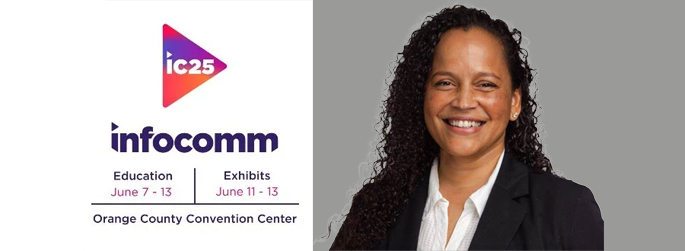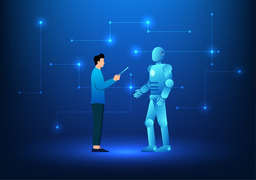The Future Needs All of Us: Noelle Russell on AI, Inclusion, and Empowered Leadership

We recently connected with Noelle Russell — founder of the AI Leadership Institute, multi-time TEDx speaker, and author of Scaling Responsible AI — ahead of her keynote at the AVIXA Women’s Breakfast during InfoComm 2025.
This year’s theme, Navigating Challenges, Embracing Triumphs: Empowering Women in Leadership, is perfect for Noelle. As a Latina in tech who built her career at the intersection of voice AI, ethics, and equity, she’s lived the realities that many women in AV know all too well: isolation, doubt, and the pressure to be twice as prepared.
Her message? AI isn’t just for engineers. It’s for everyone who builds, leads, teaches, and solves problems creatively. “Owning the future,” she told us, “means reclaiming our voice in how technology is designed, deployed, and directed.” Whether you’re managing AV installs, leading a team, or mentoring new talent, AI can be a powerful tool for amplifying your impact, not replacing it.
Through her work helping organizations scale ethical AI solutions, Noelle has seen what happens when women lead: more transparency, deeper empathy, and better outcomes. And she’s quick to remind us that leadership in the AI era doesn’t require knowing everything, just the courage to ask better questions and to build with intention.
You help people “own the future” by embracing AI. What does that look like for women and other underrepresented professionals in industries like AV?
Owning the future means reclaiming our voice in how technology is designed, deployed, and directed. For women and other underrepresented professionals in AV and similar industries, it’s about shifting from being passive users of AI to intentional leaders in its application. This looks like:
- Learning to lead AI projects, even without coding skills.
- Embedding lived experiences into AI design, ensuring the tools we build reflect real-world diversity.
- Creating career leverage, where mastery of AI accelerates your leadership path, not blocks it.
Inclusion in AI isn’t just about hiring; it’s about building systems that work for everyone because they were designed by everyone. That’s the future we’re building.
For AV professionals who haven’t traditionally seen themselves as part of the AI conversation, where do you suggest they begin to confidently integrate AI into their work and leadership?
Start with the problems you already know how to solve — just solve them faster with AI.
- Identify repetitive tasks in your day-to-day (like scheduling, content management, or email response).
- Use tools like Microsoft Copilot or ChatGPT to experiment with automating those tasks.
- Then scale your curiosity: join communities like our AI Leadership Institute and attend live learning labs designed for professionals from non-technical backgrounds.
Confidence comes from competence, and competence comes from consistent practice. You don’t need to become an engineer — you need to become a translator between your industry expertise and what AI makes possible.
In your work across industries, have you noticed how organizations with diverse leadership approach AI differently? Either in adoption, ethics, or opportunity?
Absolutely — and the difference is profound.
Organizations with diverse leadership are more likely to:
- Ask the hard questions early, especially around bias, impact, and ethical deployment.
- Design for edge cases, because the leadership is the edge case.
- Prioritize inclusive innovation over quick wins.
They understand that AI is not neutral — it reflects its creators. Diverse teams push for accountable and explainable AI, because they know what happens when systems are built without them in the room.
Your book, Scaling Responsible AI, emphasizes the importance of building AI systems that reflect real human values. What role does representation, especially of women, in leadership play in making that possible?
Representation is not a nice-to-have — it’s foundational to responsible AI.
When women are at the table:
- We prioritize transparency, because we’ve lived the consequences of being excluded.
- We design with empathy, anticipating needs others might miss.
- We push for long-term impact, not just short-term gain.
In Scaling Responsible AI, I make the case that ethical frameworks must be matched by lived experience. Human values aren’t theoretical — they’re taught, tested, and strengthened by those who have had to fight for them. That’s why we need more women leading in AI.
As AI transforms industries, it’s also reshaping leadership itself. What kind of leaders will thrive in this new era, and how can women in AV start preparing now?
AI demands a new kind of leader — one who is:
- Curious, not controlling
- Collaborative, not command-and-control
- Comfortable with ambiguity
These are traits women in AV already embody. To prepare:
- Start where you are — explore AI through your existing strengths.
- Level up your literacy — even 30 minutes a week can build momentum.
- Join ecosystems like the I ❤️ AI community, where leadership is redefined and reimagined every day.
Leadership in the AI era isn’t about knowing everything — it’s about asking better questions and empowering diverse teams to build the answers.
In addition to authoring your book, your journey also includes establishing the AI Leadership Institute. What personal experiences pushed you to step into that space as a founder and thought leader?
I didn’t start in AI — I stumbled into it as a technologist trying to help more people access information. Joining the Alexa team in 2014 without any AI background taught me two things:
- You don’t have to be “ready” — you have to be willing.
- Voice matters, literally and figuratively.
As a Latina in tech, I’ve often been the “only” in the room. I created the AI Leadership Institute so others wouldn’t have to be. My mission is to make sure any leader — regardless of background — can confidently guide their team into the future.
Many women in AV and tech describe moments of being underestimated or feeling isolated. What mindset or lesson helped you navigate those moments and kept you moving forward?
The lesson that saved me was this: “They’re not doubting you. They’re doubting what they understand about what’s possible.”
So I made it my job to:
- Stay curious instead of bitter.
- Document wins, even if no one’s clapping yet.
- Invest in community, because isolation is a tool of systems — not a reflection of worth.
You don’t need everyone to believe in you. You need to believe in what you’re building long enough for the right people to catch up.
Leadership can feel like a lonely path, especially when breaking new ground. Who or what helped you stay centered when the path wasn’t clear or easy?
Honestly? The community I didn’t have growing up — I built it.
- I stay grounded by surrounding myself with bold women doing meaningful work.
- I stay focused by teaching others, because in teaching, I clarify my own purpose.
- I stay steady by remembering: This isn’t about me, it’s about who comes next.
Leadership is lonely when you’re trying to be perfect. It’s powerful when you’re just trying to be of service.
The AVIXA Women’s Breakfast brings people together to reflect on shared challenges and celebrate leadership. Why would you say spaces like this are essential in industries like AV?
Because community amplifies courage.
In industries like AV — where visibility and voice are key — women often carry invisible leadership roles: mentoring, emotional labor, advocating behind the scenes. Events like this:
- Make that labor visible.
- Foster mentorship.
- Reignite purpose.
They remind us that we’re not anomalies — we’re a force. We just needed a room to recognize it.
Regardless of gender, what message do you hope people walk away with after hearing you speak at InfoComm 2025?
My message is simple:
AI isn’t just for coders — it’s for creators of culture. And that means you.
If you’ve ever solved a complex problem with too few resources, led with heart, or created something out of nothing — you’re already innovating. AI just gives you a bigger toolbox.
So let’s use it — to build systems that see us, serve us, and shape a future we’re proud of.
Learn more and reserve your spot at the AVIXA Women’s Breakfast here.






Please sign in or register for FREE
If you are a registered user on AVIXA Xchange, please sign in